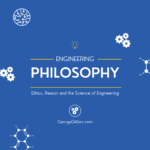Epistemology in Engineering: New Systemic Knowledge

Epistemology in Engineering:
In the dynamic world of engineering, where innovation shapes the future, knowledge serves as the cornerstone upon which progress is built. Epistemology, the philosophical study of knowledge, plays a profound role in shaping the methodologies, practices, and outcomes of engineering endeavors. In this article, we delve into the intriguing relationship between Epistemology and Engineering, exploring how the pursuit of knowledge influences every facet of the engineering process.
The Foundation of Knowledge - Epistemology
Systemic knowledge generation (Epistemology) seeks to answer fundamental questions about knowledge, truth, belief, and justification. In the context of engineering, epistemology delves into how engineers acquire, validate, and apply knowledge to solve complex problems and create technological solutions. The principles of epistemology guide engineers in understanding what they know, how they know it, and how that knowledge can be trusted.
General reference: https://en.wikipedia.org/wiki/Epistemology
The Scientific Method: A Pillar of Engineering (Epistemology)
The scientific method, a systematic approach to investigation, is a prime example of how Epistemology influences engineering. Engineers utilize this method to form hypotheses, conduct experiments, gather data, and draw conclusions. Epistemological principles underlie each step, ensuring that conclusions are based on empirical evidence and rigorous reasoning rather than assumptions or biases.
Empiricism and Engineering Realities
Empiricism, the belief in the importance of sensory experience in acquiring knowledge, is integral to engineering. Engineers rely on empirical data and observations to make informed decisions about designs, materials, and processes. Epistemology reminds engineers to critically evaluate their data sources, recognize potential biases, and ensure that conclusions are grounded in objective evidence.
Uncertainty and Engineering Knowledge
In engineering, uncertainty is inevitable due to the inherent complexities of real-world problems. Epistemology helps engineers navigate uncertainty by emphasizing the importance of acknowledging limitations, quantifying uncertainties, and making informed decisions despite incomplete information. Epistemological humility encourages engineers to recognize that knowledge is a dynamic and evolving process.
Ethical Dimensions of Epistemology in Engineering
In addition, Epistemology also extends to the ethical realm of engineering. The responsibility to base engineering decisions on accurate and reliable knowledge is a moral duty. Misrepresentation of data or manipulation of knowledge can have serious consequences, undermining the trust of stakeholders and compromising safety.
Interdisciplinary Epistemology: Fostering Innovation
Furthermore, Engineering often intersects with various fields, leading to interdisciplinary collaboration. Epistemological principles guide engineers in navigating these collaborations, helping them recognize the unique knowledge and methodologies of different disciplines. Embracing diverse perspectives enhances innovation by fostering a synthesis of knowledge from various sources.
Epistemology and Lifelong Learning
Consequently, Epistemology instills in engineers the recognition that learning is a lifelong journey. The pursuit of knowledge doesn’t end with a degree; it’s an ongoing process of inquiry, discovery, and refinement. Engineers continuously engage with new developments, adapting their knowledge to keep pace with evolving technologies and challenges.
Applying Epistemology in the real world
Following the development of the initial design proposal, i.e., Metaphysical “what it is”, the next philosophical question is “how do we know?” How do we know the proposal is “good enough” for the client’s design requirements on the minimum viable product level and the perfect world solution perspective? How do we know it won’t fail or will work unconditionally? How do we know it can be assembled in the specified manner, meeting time and volume needs?
The process of verification related to the intended performance is an important element of the design completion and release for customers’ usage. This should be addressed via analysis and simulations, followed by physical evaluation methodologies.
Referencing Systems Engineering Method: https://georgedallen.com/navigating-chaos-systems-engineering-in-vehicle-occupant-sensing/
Conclusion
In the ever-evolving landscape of engineering, epistemology serves as a guiding light, illuminating the path to knowledge, discovery, and innovation. By understanding the principles of how knowledge is acquired, justified, and applied, engineers can navigate the complexities of their field with wisdom and clarity. Epistemology’s impact on engineering is profound, shaping the methods, decisions, and outcomes that drive progress.
About George D. Allen Consulting:
George D. Allen Consulting is a pioneering force in driving engineering excellence and innovation within the automotive industry. Led by George D. Allen, a seasoned engineering specialist with an illustrious background in occupant safety and systems development, the company is committed to revolutionizing engineering practices for businesses on the cusp of automotive technology. With a proven track record, tailored solutions, and an unwavering commitment to staying ahead of industry trends, George D. Allen Consulting partners with organizations to create a safer, smarter, and more innovative future. For more information, visit www.GeorgeDAllen.com.
Contact:
Website: www.GeorgeDAllen.com
Email: inquiry@GeorgeDAllen.com
Phone: 248-509-4188
Unlock your engineering potential today. Connect with us for a consultation.


